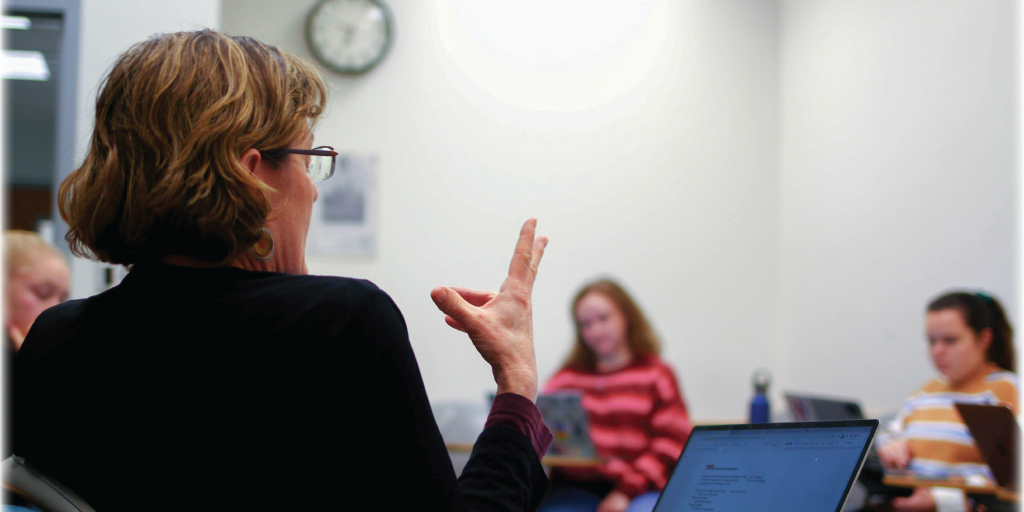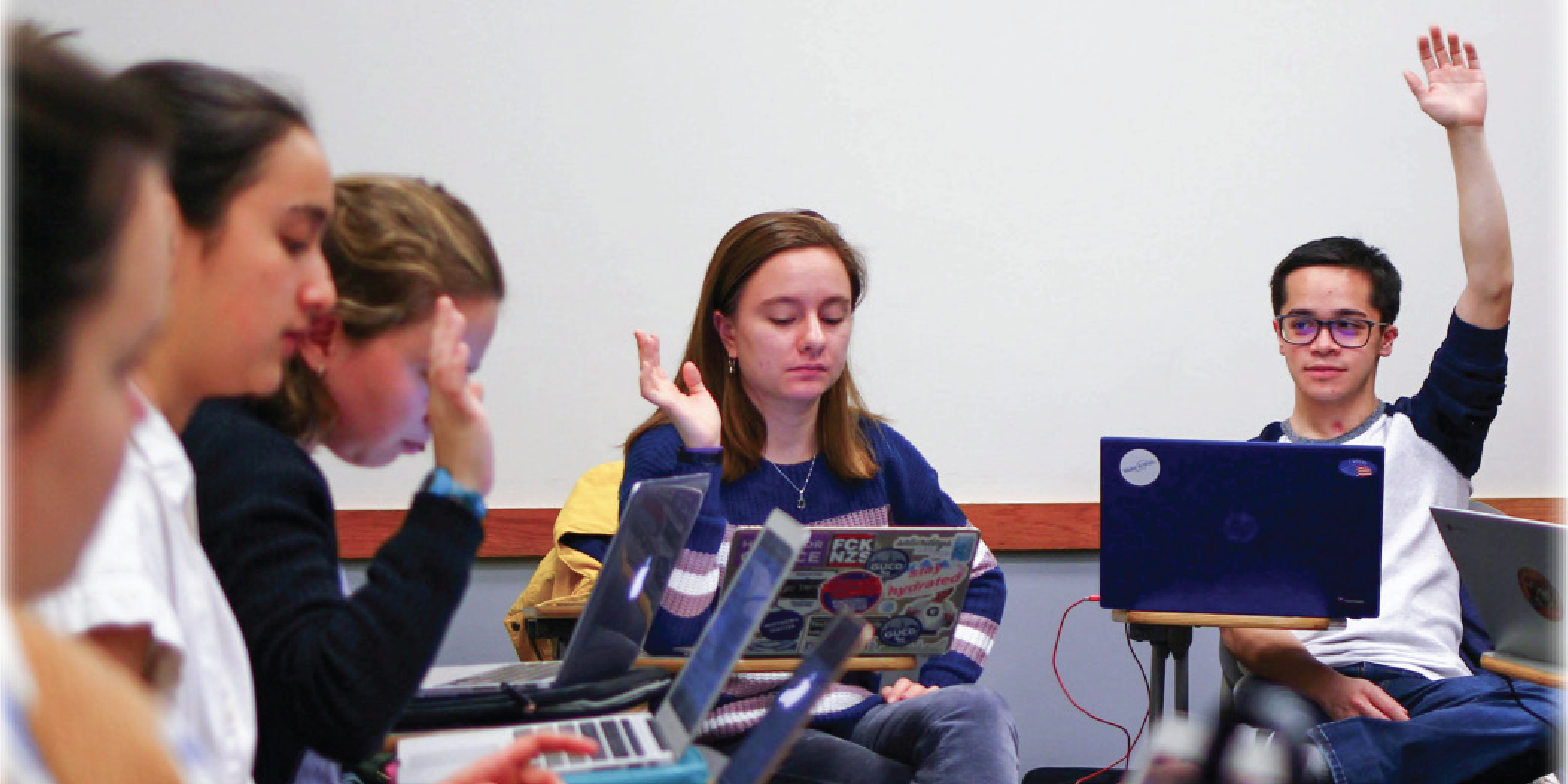Content Warning: This article discusses sexual assault.
Every registration period, Georgetown asks students to scroll through course descriptions, try every possible configuration of their schedule, and bow to the inevitability of overlapping course times. It can be easy to be lost in the monotony of this process; however, as students registered for the spring 2020 semester, a different kind of class was added to their lists. Offered in the Women’s and Gender Studies (WGST) department, the class, titled Title IX for a New Generation, is unique because of who created it—a group of students.
Every Monday and Wednesday this semester, 11 students have met in class with adjunct professor Sara Collina to design the framework and curriculum of the course, which will be taught for the first time this spring.
The course’s creators thought the university should offer an academic framework to look at Title IX, an issue of which students often have only a surface-level understanding. The class is aimed at understanding the rules and regulations of Title IX, discussing the national and on-campus context of the statute, and brainstorming ideas for improving the policy’s practices. The students designing the course tried to keep their peers’ point-of-views in mind as they created the syllabus.
“It’s created by students, for students,” said Casey Doherty (SFS ’20), a member of the class. “So we think about what we would be most interested in learning as students, as people who interact with this issue a lot and see what it’s done to people on this campus.”
Title IX, part of the Educational Amendments Act of 1972, is a federal civil rights law that prohibits sex-based discrimination—including sexual harassment and assault—within educational institutions such as Georgetown. The term “Title IX” also refers to the office on campus responsible for investigations of sexual assault at Georgetown, and the specific policies the university has for campus Title IX procedures.
The designing course and the resulting spring class, while housed in the WGST department, are made possible and funded through the Enhancing and Transforming the Core Curriculum Initiative, a multi-year pilot development initiative at Georgetown meant to broaden and expand the Core Curriculum. “The proposal review committee, and the Initiative’s leadership team, were especially excited about the development process that included the student-led design course this fall,” Vice Provost for Education Randy Bass wrote in a statement to the Voice.
To carry out their vision, the current class members will act as peer mentors in the spring, guiding the new class through the complex issues of Title IX and the lessons they created. To accommodate this, the class is double-coded: a 100-level course for regular students and a 300-level for facilitators. This way, students in next spring’s class will be able to facilitate next fall.
The 30-seat spring course is currently full, with 24 students on the waitlist. Described in Georgetown’s course catalog as “a project-based, student-created course on sex discrimination in education,” each class will be discussion-based, and the course will include a final project designed to have a tangible impact on the way Title IX operates at Georgetown.
“We have a couple of different learning objectives,” Collina said. “The purpose of this course is not only for people to better understand the issue, but to use the academic tools of critical thinking analysis, as well as creativity and collaboration, to actually address an overall problem.”
While the class recognizes that many aspects of the Title IX system are complex, and its problems cannot be solved overnight, it aims to equip future policymakers with potential solutions and reforms.
“We’re not trying to go against any existing resources on campus,” Doherty said. “We want students to think critically and be able to think against the status quo and think about how we could make these resources better without completely denigrating them.”
According to the 2019 Campus Climate Survey, 24.2 percent of respondents believe that sexual assault and misconduct is “very or extremely problematic”: On Georgetown’s campus, 31.6 percent of female-identifying undergraduates reported having been sexually assaulted since enrolling at Georgetown, higher than the 25.9 percent average from the 32 other schools that took the same survey. Reported rates of sexual assault have not decreased since 2016, despite the implementation of programs designed to prevent sexual assault. These higher rates led frustrated students to participate in the designing class when they received an email through the WGST department gauging interest.
“Georgetown is above average in these issues,” said Michael Blank (COL ’20), a student in the class. To him, the fact that Title IX affects so many people makes it a relevant class. “It is one public policy issue that is so relatable because it is all about students and all about universities and ties so directly to Georgetown like no other issue can.”
The public policy is currently being altered, which will feature in next semester’s class. Secretary of Education Betsy DeVos released suggested changes to the national Title IX guidelines last November, which set the minimum standards schools must have in their policies. These proposed changes roll back protections for students and raise the standard of evidence, and have drawn protests from the university and students alike.
This concern over Title IX-related issues is what drove Olivia Horton (COL ’20) to talk to Collina, her Gender and the Law professor, about the public policy issue. These office hour conversations eventually turned into submitting a class proposal in April. “I’m very excited,” Horton said. “It’s looking like it’s going to be a very forward looking class, which is what we were hoping for and aiming for.”
For Horton, the emphasis on projects and change-making sets the class apart. It asks students to look at Title IX in a new way, to question the status quo, and to think through what can be done to improve university policy. “We really wanted this class to focus on the progress that we can make and the power that we have as students to change the system as opposed to like the horrible changes or perceived horrible changes that might be happening,” Horton said.
To Collina, the sexual assault rates and policy changes represent an urgent crisis that warrants greater attention. She thought this class could be an academic forum to discuss the high rates of sexual assault on campus. “I have been really shocked and dismayed at what I considered to be a house on fire,” Collina said. “The numbers are shockingly bad.”
Rates of sexual assault vary widely across identities. Respondents who identified as members of the LGBTQ+ community reported a 13.5 percent assault rate, while heterosexual-identifying respondees had an 11.4 percent rate.
The racial breakdown of the 2019 survey shows that 11.9 percent of black students, 14.3 percent of white students, 7.1 of Asian students, 12.8 percent of Hispanic or Latinx students, and 14.4 percent of other and multiracial students reported nonconsensual sexual contact while at Georgetown. Students in their first year on campus were more likely to report nonconsensual sexual contact than upperclassmen. The creators of the class hope all of these communities will be present to provide their perspectives next semester.
Of the 11 students designing the course, two are men and one is a person of color, but the class aims to incorporate as many perspectives as possible in the voices that are included. According to Doherty, in order to ensure the discussion included more points of view, they posted a survey with a randomized $100 reward to get external input.
“We don’t represent all perspectives on campus, which is hard when you’re talking about an issue that’s so important and it has so many different intersectionalities,” Doherty said. “We are always looking for suggestions and ways to present this issue to the student body in a way that people feel is responsible, equitable, ethical.”
Matthew Hua (COL ’22), a student in the course, believes the diversity of voices is important so Title IX does not become relegated to a political interest issue. “I’ve heard Title IX characterized as a woman’s issue, LGBTQ, or people of color—as if it’s their issue. I disagree with that,” Hua said. “I wanted to be a part of the group of people that made sure it’s not just this separate group—it’s everybody’s problem, and we need to figure out what to do together.”
As part of their efforts to confront the problem, Collina took her students to a panel discussing the results of the 2019 Campus Climate Survey. At the panel, students from the class brought up concerns about the delay in hiring a new Title IX coordinator after Laura Cutway left in June 2018. Samantha Berner transitioned from the investigator role to the coordinator role after a year of doing both jobs, leaving the position of a full-time Title IX investigator still unfilled. The attendees also advocated for increased student representation in Title IX-related administrative decisions and Student Health Services.
The class questioned the effectiveness of bystander training as well. Since 2017, all incoming undergraduates have undergone a mandatory, school-administered bystander training workshop, meaning only the class of 2020 does not have a 100 percent rate of completion. While more students report that they intervene in situations they find questionable, reported rates of sexual misconduct have remained stagnant. Collina believes this means there is a fundamental flaw in the program.
“I am generally charmed by bystander trainings, but they don’t work,” Collina said, “They don’t work. I mean, the numbers show it.”
Doherty, a bystander training facilitator, believes there is room for improvement in prevention programs, and that it is related to the classroom she wants to create. “I really enjoy bystander training,” Doherty said. “I think if we really focus on preventative measures like that and hopefully making programs like that better, that’s how we can work with the education piece of this class, and then also with prevention methods outside of the class to really impact the culture in a positive way.”
In addition to creating a curriculum, the students have valued the process of class-building and learning about the administrative operations involved. There was a learning curve for all involved, even Collina. “I have had the honor and privilege of actually not only working with my students in terms of learning the topic, but also getting to know Georgetown’s system and some of the struggles that people have had,” Collina said.

Photo by Sarema Shorr Professor Sara Collina leads students in a class section.Photo by Sarema Shorr
The students say the university has been supportive and that members of the administration have shown enthusiasm about the direct inclusion of Title IX in the curriculum. Annemarie Bianco, associate vice president and university registrar, wrote in an email to the Voice that the university welcomes the creation of new courses, so long as they meet the expected level of academic rigor. “We not only encourage but support the innovation of new ways to develop and deliver courses,” Bianco wrote.
Additionally, the class creators want the course to fulfill a requirement in the College’s core curriculum to ease the burden for students who don’t have elective credits to spare. While they were unable to get a Humanities: Arts, Literature, and Cultures (HALC) accreditation for the spring, they hope acquiring the status next fall will make the class an option for students to fulfill their Core requirements.
In regards to the longevity of the course and the topic, Doherty would want to expand it in the future to resemble one of the core requirement classes all students must take. To her, the format and theory behind the discussion-based class could be sustainable regardless of the specific topic.
“I think there are tons of issues that we could do that for,” Doherty said. “I think it creates a unique, safe, yet challenging discussion environment where students can really engage with each other on the issue with the help of a really supportive professor.”
For all her support, Collina does not see herself as the solution to rectifying Title IX issues on college campuses. Instead, she places her hope in the students she teaches.
“I have a strong sense that I’m not going to be the one to fix this and no administrators can be the one that fixes this,” Collina said. “But I do believe deeply that it’s this generation who has the skills, the knowledge, the expertise about what it means right now, right here.”





